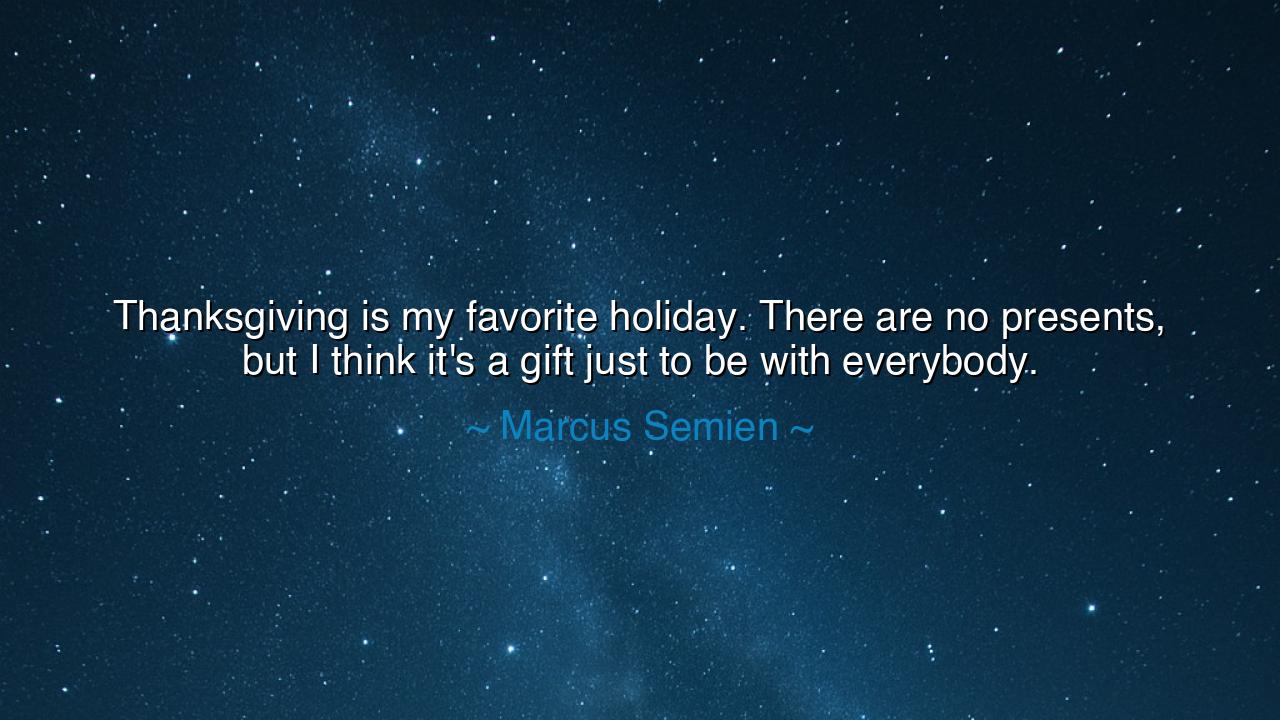
Thanksgiving is my favorite holiday. There are no presents, but
Thanksgiving is my favorite holiday. There are no presents, but I think it's a gift just to be with everybody.






"Thanksgiving is my favorite holiday. There are no presents, but I think it's a gift just to be with everybody." In this simple yet profound reflection, Marcus Semien reveals the sacred essence of Thanksgiving: that its true power is not in the exchange of presents, but in the exchange of presence. Unlike other celebrations that clothe themselves in material tokens, this holiday stands apart as a day consecrated to fellowship, gratitude, and the immeasurable richness of human connection.
The origin of this wisdom lies in the first gatherings of harvest feasts, when early settlers and their Native neighbors sat together not to exchange wealth, but to share the fruits of labor and survival. In that meal, there were no trinkets, no gifts wrapped in ribbons—only the gift of life itself, sustained by food, labor, and companionship. Semien echoes this ancient foundation, reminding us that to be together in peace, even for a day, is a treasure greater than any jewel.
Consider the story of soldiers during World War I, who, in the frozen trenches of 1914, laid down their weapons for a brief ceasefire on Christmas Eve. They had no gifts to give, no stores from which to purchase them, yet they sang songs, shared bread, and exchanged the warmth of humanity. That moment, remembered through history, was a reminder that even in darkness, the true gift is the presence of one another. Thanksgiving embodies this same truth: that simply being with those around us is a blessing beyond price.
Semien’s words also call us to shift our perspective on value. The world often teaches us to measure worth in objects, in gold, in possessions. But Thanksgiving strips all of that away and leaves us face to face with what matters most: family, friends, and community. When he says, “it’s a gift just to be with everybody,” he invites us to see with ancient eyes—to recognize that the greatest riches are not stored in vaults, but in the hearts of those who sit across the table from us.
There is something deeply heroic in this vision, for in an age of ceaseless acquisition, to celebrate without presents is to resist the tyranny of materialism. It is to declare that joy can spring not from what we own, but from who we are with. This is why Thanksgiving endures across centuries: it centers the human spirit on gratitude, on gathering, on presence. It teaches us that what makes life meaningful is not the abundance of things, but the abundance of love and belonging.
Yet there is also a call to humility here. To be with “everybody” is not only to enjoy the company of those we love, but to accept the imperfections, the disagreements, even the wounds that come with family and community. To sit together despite differences is itself a sacred offering. Just as the first Thanksgiving required different peoples to share one table, so too are we called to embrace others, even when it is not easy. The act of gathering becomes both a gift and a discipline of peace.
The lesson, then, for future generations is clear: treasure presence above presents. When you sit at the table, do not lament what is missing, but rejoice in what is before you—the laughter, the stories, the faces that have journeyed with you through life. Understand that every gathering is fleeting, that no feast lasts forever, and so each one is precious beyond measure.
And the practical action is this: when Thanksgiving arrives, let go of the rush for things, and focus on the gift of togetherness. Speak gratitude aloud. Look into the eyes of those around you. Cherish the moment not as something ordinary, but as something eternal. For in that circle of presence, you hold the greatest treasure mankind has ever known: the simple, unpurchasable joy of being with one another.






AAdministratorAdministrator
Welcome, honored guests. Please leave a comment, we will respond soon